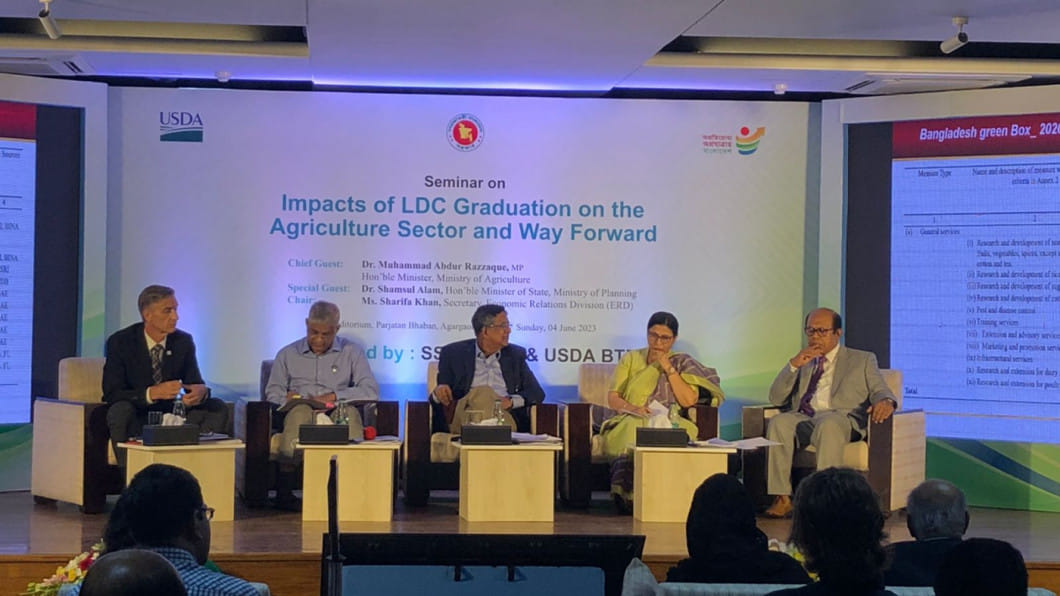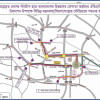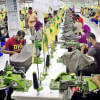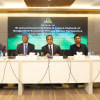Continue agri subsidy after LDC graduation under WTO rules

Bangladesh should pursue with the World Trade Organisation (WTO) to be included in the list of net food-importing developing countries after LDC graduation in a bid to continue providing subsidies on agriculture exports, experts said today.
At the same time, the country should also develop export assistance schemes in compliance with WTO provisions, they said.
The Support to Sustainable Graduation Project (SSGP) of the Economic Relations Division (ERD) and the Bangladesh Trade Facilitation Project financed by the US Department of Agriculture (USDA), jointly organised the seminar titled "Impacts of LDC Graduation on the Agriculture Sector and the Way Forward".
Speaking on the occasion, Agriculture Minister Muhammad Abdur Razzaque said Bangladesh can mitigate the impact of LDC graduation by enhancing the production and quality of its agricultural products.
State Minister for Planning Shamsul Alam said the withdrawal of LDC-specific facilities after graduation will create the compulsion for enhancing internal capacities.
ERD Secretary Sharifa Khan put emphasis on policy continuity for maintaining the growth in the agricultural sector.
She said the government is pursuing with the WTO to be included in the list of net food-importing developing countries after graduation.
Farid Aziz, additional secretary of the ERD, said the government has taken various measures to ensure a smooth and sustainable transition from LDC status.
In his keynote paper, Mohammad A Razzaque, chairman of the Research and Policy Integration for Development, noted that the average tariffs on Bangladesh's agricultural exports might increase in major overseas markets after graduation in the absence of duty-free facilities.
In this context, he put emphasis on proactive engagement with trading partners to negotiate extended preferences, enhancing the capacity of domestic firms, and reducing the cost of doing business to address the LDC graduation challenges.
As the domestic support provided for agricultural production is much lower than the allowable limit set by the WTO, the country will not face issues in widening the volume of domestic subsidy. However, the country could face significant challenges in continuing targeted export incentives for agricultural products, he said.
Razzaque recommended categorising such subsidies prudently.
Speakers also observed that the government should continue its support for agricultural production and export incentives under different schemes that are aligned with domestic demand and compliant with WTO regulations.
They also called for improving the business environment and addressing compliance issues in the agriculture sector.
The necessity of production subsidies in the context of climate change and the vulnerability of poor and marginal farmers was also highlighted.
Michael J Parr, director of the Bangladesh Trade Facilitation Project, said the USDA would provide necessary technical assistance to Bangladesh in facilitating agricultural trade through process simplification, management process automation, capacity building of food and chemical laboratories, and encouraging investment to improve the cold chain system.
Mostafa Abid Khan, a former member of the Bangladesh Trade and Tariff Commission, Md Tofazzel Hossain, additional secretary of the fisheries and livestock ministry, Md Tajul Islam Patwary, director of the Department of Agricultural Extension, Scott Brandon, political and economic counsellor of the US embassy in Dhaka; and Uzma Chowdhury, director of Pran-RFL Group, also spoke.

 For all latest news, follow The Daily Star's Google News channel.
For all latest news, follow The Daily Star's Google News channel. 







Comments